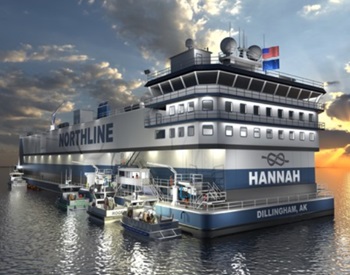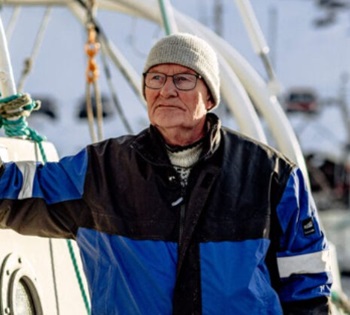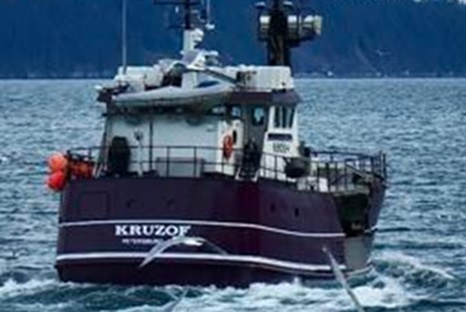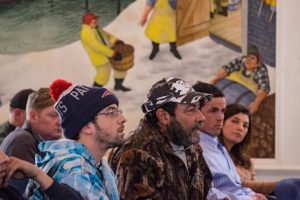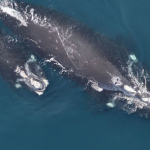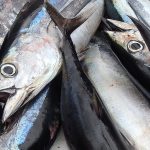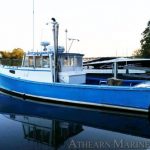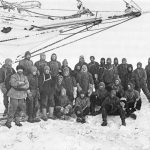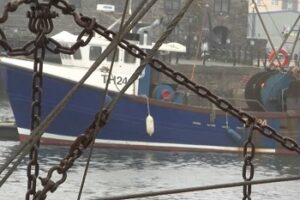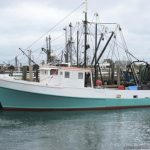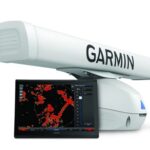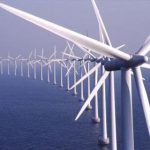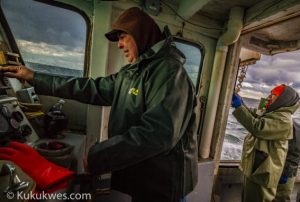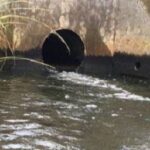Tag Archives: Alaska
OPINION: Peltola pulls for Alaska fishermen, By Linda Behnken
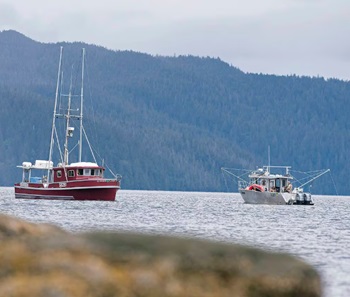 Wild seafood provides food security and livelihoods across the country, but nowhere is that more true than in Alaska. We are fortunate to have a leader who not only has her own boots in fisheries but is bold enough to drive hard conversations around our biggest challenges. In the North Pacific, that includes bycatch management and habitat protection — not only as a foundation for sustainable management, but as a critical part of climate resilience. We’ve seen the complete collapse of two iconic Alaska crab species, and elimination of subsistence fishing on major rivers with communities highly dependent upon that food resource. We’ve witnessed the abrupt crash of Gulf of Alaska cod following the 2014-2016 marine heat wave. As fish stocks and ocean conditions change more quickly and more substantially than ever before, we need conservation tools that match the pace with that change to safeguard ocean health. more, >>CLICK TO READ<< 07:33
Wild seafood provides food security and livelihoods across the country, but nowhere is that more true than in Alaska. We are fortunate to have a leader who not only has her own boots in fisheries but is bold enough to drive hard conversations around our biggest challenges. In the North Pacific, that includes bycatch management and habitat protection — not only as a foundation for sustainable management, but as a critical part of climate resilience. We’ve seen the complete collapse of two iconic Alaska crab species, and elimination of subsistence fishing on major rivers with communities highly dependent upon that food resource. We’ve witnessed the abrupt crash of Gulf of Alaska cod following the 2014-2016 marine heat wave. As fish stocks and ocean conditions change more quickly and more substantially than ever before, we need conservation tools that match the pace with that change to safeguard ocean health. more, >>CLICK TO READ<< 07:33
Houseboat Dwellers Can Now Generate All the Electricity They Need From the Ocean
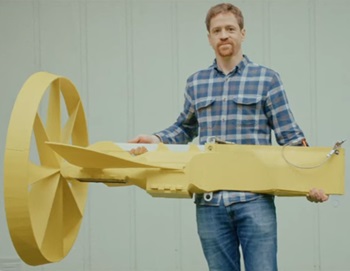 The oceans contain nearly unimaginable amount of power. Engineers have long dreamed of transforming some of it into electricity. Complex past concepts have ranged from “tide farms” that include hundreds of rising floats moored to the ocean bottom to huge hydro-electric dams blocking off harbors. Now, a startup in Alaska has a new personal hydrogenerator design so simple it is 3D-printable. You can lower it over the side of a boat, just like an anchor. Whether the tides are coming in or going out, the water spins the turbine and generates 1.6 kW of power. When would this be useful? Anytime a boat is anchored or docked for an extended time. Video, more, >>CLICK TO READ<< 11:26
The oceans contain nearly unimaginable amount of power. Engineers have long dreamed of transforming some of it into electricity. Complex past concepts have ranged from “tide farms” that include hundreds of rising floats moored to the ocean bottom to huge hydro-electric dams blocking off harbors. Now, a startup in Alaska has a new personal hydrogenerator design so simple it is 3D-printable. You can lower it over the side of a boat, just like an anchor. Whether the tides are coming in or going out, the water spins the turbine and generates 1.6 kW of power. When would this be useful? Anytime a boat is anchored or docked for an extended time. Video, more, >>CLICK TO READ<< 11:26
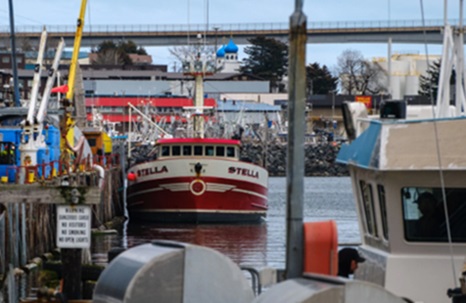
The seafood industry is in trouble. Processors and policy makers blame Russia.
Alaska waters produce the most seafood in the country, and many of the state’s coastal communities depend on commercial fisheries to sustain their economy. But Alaska’s fisheries are facing a massive economic slump right now and policymakers are increasingly blaming flooded global markets. The private sector and federal policymakers are teaming up to try to stop the bleeding. Last year was brutal on the seafood industry. Processing companies and fishermen alike suffered amid cratering prices, and they blamed Russia for flooding markets. Republican U.S. Sen. Dan Sullivan, from Alaska, pointed his finger at the country at a news conference on May 23. “Russians have essentially admitted they’re not just at war in Ukraine, they’re at war with the American fishing industry,” he said. more, >>CLICK TO READ<< 16:03
‘You can’t be a fisherman if you’re not an optimist’-Ken Coleman, longtime advocate for the east side setnet fishery, dead at 72
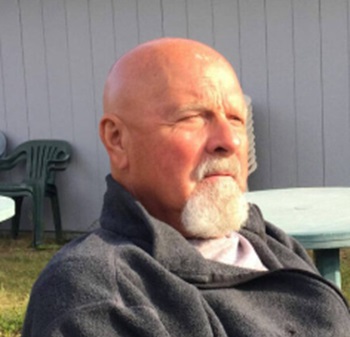 Ken Coleman, the vice president of the Kenai Peninsula Fishermen’s Association and longtime advocate for the east side setnet fishery, died recently at the age of 72. His friends remember him as a hardworking man who was resolute in his convictions and who worked to make Alaska better through his final days. Gary Hollier, a longtime commercial fisher in the ESSN, said last week that he met Coleman in high school and counted him as a friend for more than 50 years. The two entered the setnet fishery at the same time and raised their families on their fishing sites. Hollier described Coleman as the “ultimate professional” — whether the fishing was good or not, he always was geared up and ready. Coleman passed those values to his children. more, >>CLICK TO READ<< 10:38
Ken Coleman, the vice president of the Kenai Peninsula Fishermen’s Association and longtime advocate for the east side setnet fishery, died recently at the age of 72. His friends remember him as a hardworking man who was resolute in his convictions and who worked to make Alaska better through his final days. Gary Hollier, a longtime commercial fisher in the ESSN, said last week that he met Coleman in high school and counted him as a friend for more than 50 years. The two entered the setnet fishery at the same time and raised their families on their fishing sites. Hollier described Coleman as the “ultimate professional” — whether the fishing was good or not, he always was geared up and ready. Coleman passed those values to his children. more, >>CLICK TO READ<< 10:38
Copper River salmon aficionados hail arrival of first fish
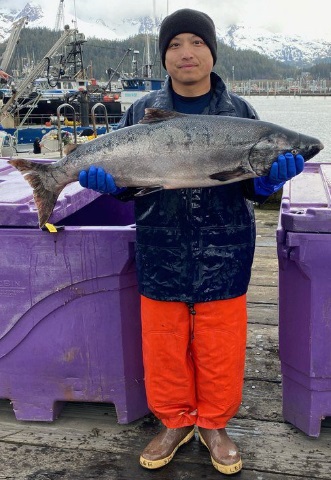 In Cordova the first 12-hour opener of the Copper River commercial salmon fishery, with 376 deliveries, yielded a catch of nearly 43,000 sockeye salmon, 1,108 Chinook, 247 chum, and two cohos to processors. The second opener, with 400 deliveries, brought in another 51,994 sockeye, 1,284 Chinook, 2,182 chum, and 62 coho salmon. As of May 21, the Alaska Department of Fish and Game’s Cordova office said that the overall catch stood at 93,851 sockeye, 2,392 Chinook, 2,433 chum, and 64 coho salmon. Processors were offering $7 a pound for sockeyes and $16 a pound for kings. Meanwhile, a chance to sample the first Copper River sockeye salmon drew some 400 seafood fans to Anchorage ski slopes on Saturday, May 18, where they dined on appetizers prepared by top chefs and bid in an auction that raised $8,350 for the Make A Wish Foundation. more, >>CLICK TO READ<< 14:17
In Cordova the first 12-hour opener of the Copper River commercial salmon fishery, with 376 deliveries, yielded a catch of nearly 43,000 sockeye salmon, 1,108 Chinook, 247 chum, and two cohos to processors. The second opener, with 400 deliveries, brought in another 51,994 sockeye, 1,284 Chinook, 2,182 chum, and 62 coho salmon. As of May 21, the Alaska Department of Fish and Game’s Cordova office said that the overall catch stood at 93,851 sockeye, 2,392 Chinook, 2,433 chum, and 64 coho salmon. Processors were offering $7 a pound for sockeyes and $16 a pound for kings. Meanwhile, a chance to sample the first Copper River sockeye salmon drew some 400 seafood fans to Anchorage ski slopes on Saturday, May 18, where they dined on appetizers prepared by top chefs and bid in an auction that raised $8,350 for the Make A Wish Foundation. more, >>CLICK TO READ<< 14:17
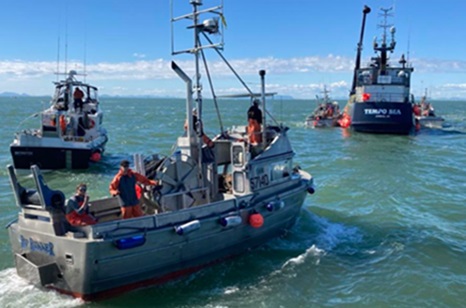
From Minnesota to Bristol Bay: Father and sons prepare for another season of wild Alaskan salmon fishing
School is winding down, but for Gibbon-Fairfax-Winthrop teacher Roger Rogotzke, summer brings another gig, commercial fishing. Rogotzke has been making the trip to Bristol Bay to catch wild Alaskan salmon since 1982. “That’s a couple of years ago already,” he said during a recent conversation with sons Tom and Jay. Together, the three make up Rogotzke Fish Company. Roger first became interested in commercial fishing when he was attending Gustavus Adolphus College. He picked up a magazine in the college’s library and happened to read an article on the topic. He wondered if he could find a way to get to Bristol Bay and eventually, he said, he was able to make it happen. He crewed for a guy from Idaho for a couple of years, and his brother Dave also joined him. more, >>CLICK TO READ<< 09:17
First Nations advocates resolve to put traditional fishing rights under international spotlight
 First Nations delegates from Japan, Taiwan, Canada, Alaska, and Australia have met on the lands of Walbunga Yuin people on the NSW far south coast for the International Indigenous Fishing Symposium. Indigenous fishing rights activists in NSW are working with First Nations groups around the world to put a global spotlight on the battle to protect traditional fishing rights and cultural practices. The groups plan to work together to lobby the United Nations. more, >>CLICK TO READ<< 07:56
First Nations delegates from Japan, Taiwan, Canada, Alaska, and Australia have met on the lands of Walbunga Yuin people on the NSW far south coast for the International Indigenous Fishing Symposium. Indigenous fishing rights activists in NSW are working with First Nations groups around the world to put a global spotlight on the battle to protect traditional fishing rights and cultural practices. The groups plan to work together to lobby the United Nations. more, >>CLICK TO READ<< 07:56
Old Glory convoy headed to Alaska’s Denali National Park in wake of flag ban on construction trucks
 Despite a decision by Denali National Park officials to bar construction workers in the park from displaying American flags from their trucks, Old Glory will be on full display on May 26. In the wake of park officials’ decision to ban U.S. flags from construction vehicles, Alaskans are planning a patriotic convoy to the park’s main entrance. News of the flag ban on construction vehicles has spread across the nation ever since the Alaska Watchman first broke the story on May 23, when a construction worker blew the whistle. He said the workers were barred from flying flags atop their trucks and equipment because the sight of Old Glory was deemed to detract from the visitors’ experience. more, >>CLICK TO READ<< 08:52
Despite a decision by Denali National Park officials to bar construction workers in the park from displaying American flags from their trucks, Old Glory will be on full display on May 26. In the wake of park officials’ decision to ban U.S. flags from construction vehicles, Alaskans are planning a patriotic convoy to the park’s main entrance. News of the flag ban on construction vehicles has spread across the nation ever since the Alaska Watchman first broke the story on May 23, when a construction worker blew the whistle. He said the workers were barred from flying flags atop their trucks and equipment because the sight of Old Glory was deemed to detract from the visitors’ experience. more, >>CLICK TO READ<< 08:52
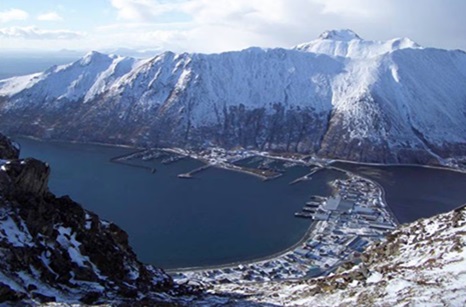
OPINION: Fighting for our lives in King Cove
I am a fisherman; one of my grandfathers was a fisherman and the other one was a lifelong employee of Peter Pan Seafoods. My father was a fisherman, my brother is a fisherman and my mother, for much of her working life, worked for Peter Pan. We live in the southwest Aleut community of King Cove. For my extended family and all the other families like mine, we rely upon our knowledge of the ocean, our skills in the harvesting of fish, and a fish processor that pays a fair price. At the end of each day, we enjoy the satisfaction of hard work paying off. As King Cove’s mayor, it hurts my heart to say that it has taken only a few short months for me to no longer recognize my world. Events have conspired to threaten our very existence. A collapse of our incomes, individually and citywide, the shock of realizing that municipal projects, many years in the making, may grind to a halt. more, >>CLICK TO READ<< 20:35
Lisa Murkowski concerned with NOAA fisheries’ to list Alaska Chinook Salmon as endangered
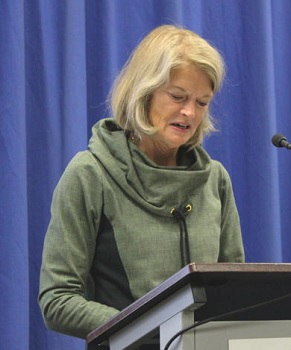 In Washington D.C. on Thursday, NOAA Fisheries announced a petition to list Gulf of Alaska Chinook Salmon as “threatened or endangered” under the Endangered Species Act. Senator Lisa Murkowski expressed her concern in the following statement: “Incredibly, NOAA is moving ahead even after finding that the Wild Fish Conservancy’s petition ‘contained numerous factual errors, omissions, incomplete references, and unsupported assertions and conclusions.’ As we fight to save our salmon and salmon fisheries alike, we need to rely on the best available science, instead of half-baked petitions intended to get conservation groups a foot in the door to attack our fisheries and resource development.” more, >>CLICK TO READ<< 09:54
In Washington D.C. on Thursday, NOAA Fisheries announced a petition to list Gulf of Alaska Chinook Salmon as “threatened or endangered” under the Endangered Species Act. Senator Lisa Murkowski expressed her concern in the following statement: “Incredibly, NOAA is moving ahead even after finding that the Wild Fish Conservancy’s petition ‘contained numerous factual errors, omissions, incomplete references, and unsupported assertions and conclusions.’ As we fight to save our salmon and salmon fisheries alike, we need to rely on the best available science, instead of half-baked petitions intended to get conservation groups a foot in the door to attack our fisheries and resource development.” more, >>CLICK TO READ<< 09:54
NOAA starts review process to list Alaska Chinooks as threatened or endangered
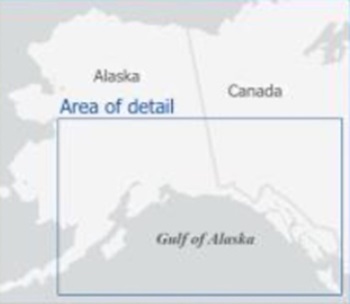 NOAA Fisheries on Thursday announced a 90-day finding on a petition to list Gulf of Alaska Chinook salmon “or any evolutionarily significant unit that may exist in the petitioned area, as a threatened or endangered species under the Endangered Species Act and to designate critical habitat concurrent with the listing.” The listing proposal comes after pressure from the Wild Fish Conservancy in Seattle, which filed a petition in January calling for federal protection of Alaska Chinook. “For decades, scientists have been sounding the alarm that Alaska’s Chinook are in dire trouble,” said Emma Helverson, executive director of the Wild Fish Conservancy. “Despite existing management plans and years of efforts by the state of Alaska, Chinook salmon continue to decline in abundance, size, diversity, and spatial structure throughout the state. Through this action, we are asking the federal government to undertake a formal status review and implement protections warranted under the Endangered Species Act, including designating critical habitat protections, to ensure the survival of these iconic fish.” more, >>CLICK TO READ<< 12:33
NOAA Fisheries on Thursday announced a 90-day finding on a petition to list Gulf of Alaska Chinook salmon “or any evolutionarily significant unit that may exist in the petitioned area, as a threatened or endangered species under the Endangered Species Act and to designate critical habitat concurrent with the listing.” The listing proposal comes after pressure from the Wild Fish Conservancy in Seattle, which filed a petition in January calling for federal protection of Alaska Chinook. “For decades, scientists have been sounding the alarm that Alaska’s Chinook are in dire trouble,” said Emma Helverson, executive director of the Wild Fish Conservancy. “Despite existing management plans and years of efforts by the state of Alaska, Chinook salmon continue to decline in abundance, size, diversity, and spatial structure throughout the state. Through this action, we are asking the federal government to undertake a formal status review and implement protections warranted under the Endangered Species Act, including designating critical habitat protections, to ensure the survival of these iconic fish.” more, >>CLICK TO READ<< 12:33
Alaska’s declining crab population due to trawlers catches attention of lawmaker
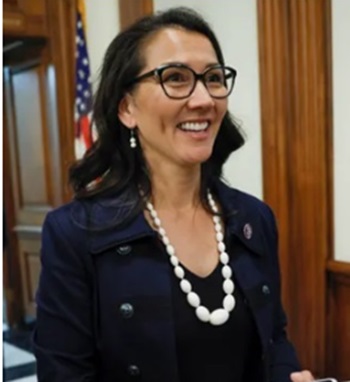 Alaska Rep. Mary Peltola’s mounting frustration with the largely Seattle-based pollock industry’s decades-old issue of inadvertently damaging the state’s rapidly declining crab populations and critical habitat for many other species may result in legislation a move heralded by the scientific and conservation communities. Members of the scientific community concerned with sustainability and conservation are currently in a deadlock with industrial pollock trawler fleets and the North Pacific Fishery Management Council over federal fishery regulations, including pelagic, or “mid-water” trawling, which uses wide-mouthed nets designed to target schools of Bering Sea Alaskan pollock. The Alaska Marine Conservation Council released a report in February 2023 analyzing the trawlers’ impact on red king crab habitats following the 2022 closure of the Alaska snow crab fisheries, which is still ongoing, and a two-year closure for Bristol Bay king crab that ended in 2023, underscoring the devastating environmental and financial toll. more, >>CLICK TO READ<< 19:17
Alaska Rep. Mary Peltola’s mounting frustration with the largely Seattle-based pollock industry’s decades-old issue of inadvertently damaging the state’s rapidly declining crab populations and critical habitat for many other species may result in legislation a move heralded by the scientific and conservation communities. Members of the scientific community concerned with sustainability and conservation are currently in a deadlock with industrial pollock trawler fleets and the North Pacific Fishery Management Council over federal fishery regulations, including pelagic, or “mid-water” trawling, which uses wide-mouthed nets designed to target schools of Bering Sea Alaskan pollock. The Alaska Marine Conservation Council released a report in February 2023 analyzing the trawlers’ impact on red king crab habitats following the 2022 closure of the Alaska snow crab fisheries, which is still ongoing, and a two-year closure for Bristol Bay king crab that ended in 2023, underscoring the devastating environmental and financial toll. more, >>CLICK TO READ<< 19:17
Alaska Legislature approves seafood task force for sector in ‘crisis’
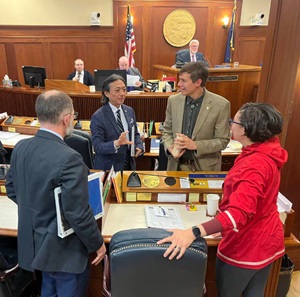 The Alaska Legislature on Sunday approved creating a task force to make policy recommendations to help the beleaguered commercial fishing industry. The task force is modeled be off another legislative task force created more than 20 years ago to help the salmon industry. At the time, salmon fishermen were struggling with the impacts of low prices and competition with farmed salmon. Alaska’s commercial fishing sector has recently struggled with low prices, a global market swamped with low-priced Russian seafood, and the closure of several seafood processing plants. Salmon returns have crashed in critical fisheries across Alaska. The United Fishermen of Alaska estimates that the state’s economy lost over $2 billion in 2023 alone as a result of the commercial fishing sector’s struggles. more, >>CLICK TO READ<< 08:00
The Alaska Legislature on Sunday approved creating a task force to make policy recommendations to help the beleaguered commercial fishing industry. The task force is modeled be off another legislative task force created more than 20 years ago to help the salmon industry. At the time, salmon fishermen were struggling with the impacts of low prices and competition with farmed salmon. Alaska’s commercial fishing sector has recently struggled with low prices, a global market swamped with low-priced Russian seafood, and the closure of several seafood processing plants. Salmon returns have crashed in critical fisheries across Alaska. The United Fishermen of Alaska estimates that the state’s economy lost over $2 billion in 2023 alone as a result of the commercial fishing sector’s struggles. more, >>CLICK TO READ<< 08:00
Deadliest Catch’ Season 20: Which Captains Will Return?
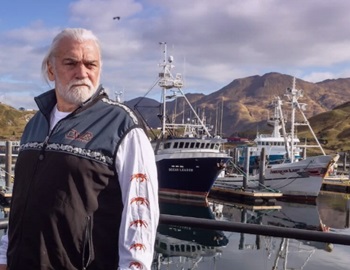 Deadliest Catch is back. In the landmark 20th season of the Discovery Channel reality series, the captains will encounter new opportunities and fresh challenges as they head out to sea for the first red king crab season in several years. Not only will crews be allowed to fish once more for the coveted red king crab, but this year, they’ll also participate in the first derby-style race in decades. That means even more intense competition than usual as both veteran and rookie captains fight to bring in the biggest hauls. At the same time, they’ll face unpredictable and dangerous weather patterns as a rare super El Niño weather pattern intensifies winter storms. Video, more, >>CLICK TO READ<< 12:51
Deadliest Catch is back. In the landmark 20th season of the Discovery Channel reality series, the captains will encounter new opportunities and fresh challenges as they head out to sea for the first red king crab season in several years. Not only will crews be allowed to fish once more for the coveted red king crab, but this year, they’ll also participate in the first derby-style race in decades. That means even more intense competition than usual as both veteran and rookie captains fight to bring in the biggest hauls. At the same time, they’ll face unpredictable and dangerous weather patterns as a rare super El Niño weather pattern intensifies winter storms. Video, more, >>CLICK TO READ<< 12:51
Bill will allow higher insurance reimbursements for injured commercial fishermen
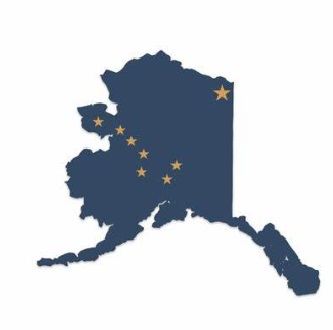 Injured commercial fishermen and boat owners in Alaska will now be able to access higher insurance reimbursements, thanks to Senate Bill 93, which was signed into law last month. The bill was sponsored by the Senate Labor and Commerce Committee, which Nikiski Republican Sen. Jesse Bjorkman chairs. It concerns the fishermen’s fund, which was established pre-statehood as a service to commercial fishermen who are injured while fishing. It’s funded by fees from commercial fishing licenses. “The Alaska fishermen’s fund reimburses licensed fishermen and boat owners for their out-of-pocket medical costs if they have been injured or have a qualified illness while fishing off-shore, or doing fishing-related work on-shore,” more, >>CLICK TO READ<< 13:00
Injured commercial fishermen and boat owners in Alaska will now be able to access higher insurance reimbursements, thanks to Senate Bill 93, which was signed into law last month. The bill was sponsored by the Senate Labor and Commerce Committee, which Nikiski Republican Sen. Jesse Bjorkman chairs. It concerns the fishermen’s fund, which was established pre-statehood as a service to commercial fishermen who are injured while fishing. It’s funded by fees from commercial fishing licenses. “The Alaska fishermen’s fund reimburses licensed fishermen and boat owners for their out-of-pocket medical costs if they have been injured or have a qualified illness while fishing off-shore, or doing fishing-related work on-shore,” more, >>CLICK TO READ<< 13:00
Anchoring the Family: The Life, Labor and Love of an Alaskan Fishing Mom
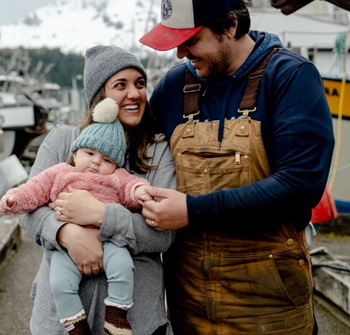 It’s called a labor of love for a reason. A life in fishing – especially in Alaska – can be equally rough and rewarding, spending days at sea where the wonders of the world take shape in glacial ridges and splashes of fish slipping over each other on deck. What you don’t always see is the effort, will, patience and passion of the people caring for those on the water from behind the shoreline. On the rugged coast of southern Alaska, where icy waters provide hope for a rich season, Kinsey Brown and her husband, Zeke, have woven their lives into the fabric of their small fishing community. It’s been said countless times by dedicated seafood harvesters across the globe that fishing is more than a livelihood. It’s a calling, community and a legacy that nearly all who fish hope to pass down to the newest generations of their fishing families. Video, photos, more, >>CLICK TO READ<< 10:30
It’s called a labor of love for a reason. A life in fishing – especially in Alaska – can be equally rough and rewarding, spending days at sea where the wonders of the world take shape in glacial ridges and splashes of fish slipping over each other on deck. What you don’t always see is the effort, will, patience and passion of the people caring for those on the water from behind the shoreline. On the rugged coast of southern Alaska, where icy waters provide hope for a rich season, Kinsey Brown and her husband, Zeke, have woven their lives into the fabric of their small fishing community. It’s been said countless times by dedicated seafood harvesters across the globe that fishing is more than a livelihood. It’s a calling, community and a legacy that nearly all who fish hope to pass down to the newest generations of their fishing families. Video, photos, more, >>CLICK TO READ<< 10:30
Fear, legacy and the Alaska seafood industry
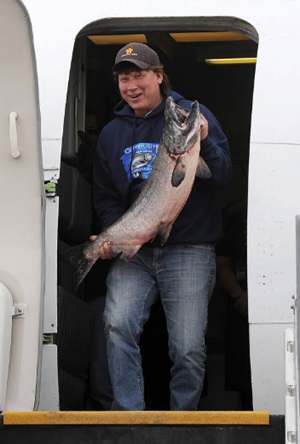 My journey began from a deep-rooted fear — the fear of watching a livelihood, passed through generations of commercial fishermen, slip through my fingers. Three decades ago, I was a young Copper River fisherman caught in the middle of a market crash. Farmed salmon had just entered the U.S., tanking prices for wild Alaska salmon. As a young commercial fisherman, fiercely proud of the salmon I caught, this shift turned my world upside down. At that moment, I made a pivotal decision — band with three other fishermen, three other fishermen, and wage a battle for the premium markets I felt Alaska salmon rightfully deserved. Spoiler alert: It’s been three decades, and we’re still fighting every day to compete. With experience, I’ve learned that my competition extends beyond other seafood; it’s beef, poultry and other proteins that occupy the “center of the plate.” In the face of market crises, conflicts, recessions, political turmoil and economic challenges, the burden I bear today mirrors the weight I carried in my 20s, but the challenges are now bigger and more complex. more, >>CLICK TO READ<< 21:41
My journey began from a deep-rooted fear — the fear of watching a livelihood, passed through generations of commercial fishermen, slip through my fingers. Three decades ago, I was a young Copper River fisherman caught in the middle of a market crash. Farmed salmon had just entered the U.S., tanking prices for wild Alaska salmon. As a young commercial fisherman, fiercely proud of the salmon I caught, this shift turned my world upside down. At that moment, I made a pivotal decision — band with three other fishermen, three other fishermen, and wage a battle for the premium markets I felt Alaska salmon rightfully deserved. Spoiler alert: It’s been three decades, and we’re still fighting every day to compete. With experience, I’ve learned that my competition extends beyond other seafood; it’s beef, poultry and other proteins that occupy the “center of the plate.” In the face of market crises, conflicts, recessions, political turmoil and economic challenges, the burden I bear today mirrors the weight I carried in my 20s, but the challenges are now bigger and more complex. more, >>CLICK TO READ<< 21:41
Loved ones gather for reading of 264 names on Fishermen’s Memorial and the Blessing of the Fleet
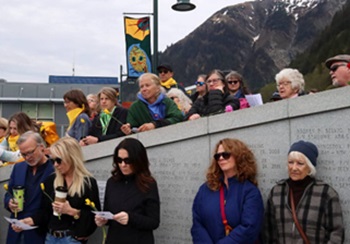 Brett Van Alen was a commercial seiner and troller in Southeast Alaska, as well as a fisher for squid and sardines in California, who died last December aboard a boat at the age of 38, according to his father Ben. On Saturday members of Brett’s extended family gathered at the Alaska Commercial Fishermen’s Memorial for an annual ceremony where his name was announced as one of the six that will be engraved into the memorial wall this summer. The reading of the 264 names on the wall, including those being engraved this year, to honor people lost at sea and others involved in the fishing industry occurred following the 34th annual Blessing of the Fleet at the downtown wharf. Photos, more, >>CLICK TO READ<< 07:46
Brett Van Alen was a commercial seiner and troller in Southeast Alaska, as well as a fisher for squid and sardines in California, who died last December aboard a boat at the age of 38, according to his father Ben. On Saturday members of Brett’s extended family gathered at the Alaska Commercial Fishermen’s Memorial for an annual ceremony where his name was announced as one of the six that will be engraved into the memorial wall this summer. The reading of the 264 names on the wall, including those being engraved this year, to honor people lost at sea and others involved in the fishing industry occurred following the 34th annual Blessing of the Fleet at the downtown wharf. Photos, more, >>CLICK TO READ<< 07:46
The federal government is assuming management of salmon fishing in parts of Alaska’s Cook Inlet
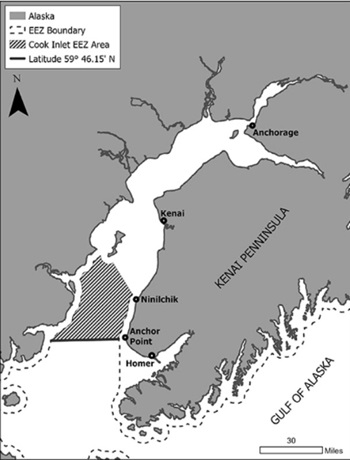 Commercial and recreational salmon fishing in the federal waters of Cook Inlet will resume this summer, but under new management by the federal government, according to a rule made final this week. Until now, the state had managed salmon fisheries in both state and federal waters of the inlet. But the switch in management was ordered by federal courts, as a result of litigation stretching back a decade. The United Cook Inlet Drift Association, or UCIDA, which is made up of commercial salmon fishers, sued the federal government in 2013 for failing to develop a salmon harvest management plan for the federal waters of the inlet. more, >>CLICK TO READ<< 13:11
Commercial and recreational salmon fishing in the federal waters of Cook Inlet will resume this summer, but under new management by the federal government, according to a rule made final this week. Until now, the state had managed salmon fisheries in both state and federal waters of the inlet. But the switch in management was ordered by federal courts, as a result of litigation stretching back a decade. The United Cook Inlet Drift Association, or UCIDA, which is made up of commercial salmon fishers, sued the federal government in 2013 for failing to develop a salmon harvest management plan for the federal waters of the inlet. more, >>CLICK TO READ<< 13:11
Alaska lawmakers, residents ask feds to limit how much salmon industrial trawlers catch
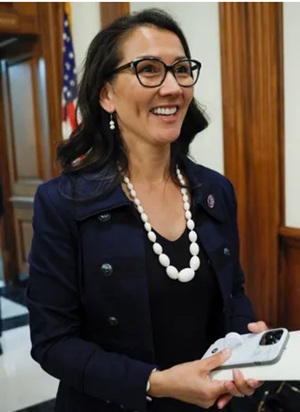 U.S. Rep. Mary Peltola, Alaskan Natives, and family-owned fisheries are looking for a sea change in the fishing rights battle between local fishermen and industrial trawling fishing operations after a federal council recently denied a tribe-approved reduction in chum salmon catches. In western Alaska, local communities are facing a significant decline in salmon populations. The cause of this decline remains a subject of intense debate between industry leaders, subsistence communities, conservation scientists, and local fishermen. Residents point to the Seattle-based trawler fleets in the Bering Sea fishing for pollock but unintentionally catching thousands of chum salmon as bycatch instead. more, >>CLICK TO READ<< 11:31
U.S. Rep. Mary Peltola, Alaskan Natives, and family-owned fisheries are looking for a sea change in the fishing rights battle between local fishermen and industrial trawling fishing operations after a federal council recently denied a tribe-approved reduction in chum salmon catches. In western Alaska, local communities are facing a significant decline in salmon populations. The cause of this decline remains a subject of intense debate between industry leaders, subsistence communities, conservation scientists, and local fishermen. Residents point to the Seattle-based trawler fleets in the Bering Sea fishing for pollock but unintentionally catching thousands of chum salmon as bycatch instead. more, >>CLICK TO READ<< 11:31
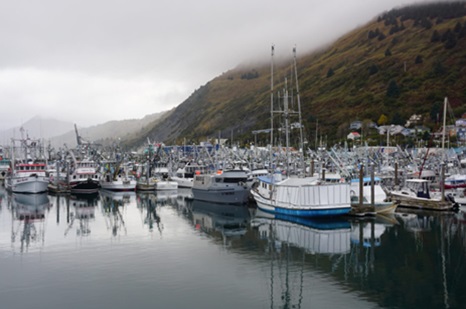
Report portrays mixed picture of Alaska’s huge seafood industry
The report from the McKinley Research Group, titled The Economic Value of Alaska’s Seafood Industry, is the latest in a periodic series commissioned by the Alaska Seafood Marketing Institute. The total economic value of the Alaska seafood industry in 2021 and 2022 was $6 billion, slightly more than the $5.6 billion tallied in 2019, the last full year prior to the COVID-19 pandemic, according to the new report and the previous version published in 2022. Along with that good news, the McKinley Research Group’s report contains a warning about the industry’s economic future. The seafood industry, between harvesters, processors and managers, accounted for 48,000 jobs on average in 2021 and 2022, equivalent to 29,100 full-time positions, the report said. That is a reduction from the 62,200 total jobs in 2019, the equivalent of 37,400 full-time positions. more, >>CLICK TO READ<< 11:21
Commercial Fisherman Gainhart (Bud) Samuelson Junior, 77, of Petersburg has passed away
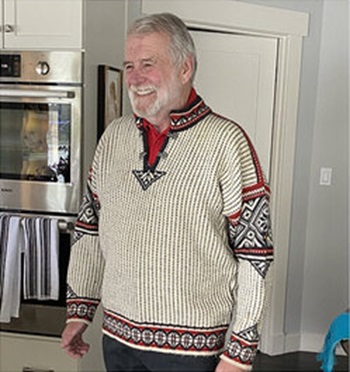 Bud was born on February 13, 1947, to Gainhart Samuelson, Senior, and Mildred (Massey) Samuelson. A lifelong resident of Petersburg, he grew up living with his mother and siblings on Hammer Slough. Summers were spent with his father at Portage Bay, where he loved fishing and hunting and grew determined to one day run a commercial fishing vessel of his own and to be a good provider for his family. After graduating from Petersburg High School in 1965, Bud landed a job on Andy Wikan’s boat, crabbing, longlining and seining aboard the wooden fishing vessel Pacific Sea. Before long, his dream future began to clarify around the captain’s lovely daughter, Audrey Wikan. Determined to impress, Bud’s fishing career accelerated until he was crabbing, seining, tendering and longlining throughout Southeast Alaska, the Gulf of Alaska, and the Bering Sea. more, >>CLICK TO READ<< 20:23
Bud was born on February 13, 1947, to Gainhart Samuelson, Senior, and Mildred (Massey) Samuelson. A lifelong resident of Petersburg, he grew up living with his mother and siblings on Hammer Slough. Summers were spent with his father at Portage Bay, where he loved fishing and hunting and grew determined to one day run a commercial fishing vessel of his own and to be a good provider for his family. After graduating from Petersburg High School in 1965, Bud landed a job on Andy Wikan’s boat, crabbing, longlining and seining aboard the wooden fishing vessel Pacific Sea. Before long, his dream future began to clarify around the captain’s lovely daughter, Audrey Wikan. Determined to impress, Bud’s fishing career accelerated until he was crabbing, seining, tendering and longlining throughout Southeast Alaska, the Gulf of Alaska, and the Bering Sea. more, >>CLICK TO READ<< 20:23
Owner, captains of crab fishing vessels charged with illegally transporting crab from Alaska
 A federal grand jury in Alaska returned an indictment charging the owner and captains of two crab catcher vessels with illegally transporting crab from Alaska, in violation of the Lacey Act. According to court documents, Corey Potter is the owner of the two crab catching vessels, and Corey Potter and Kyle Potter are the captains of the vessels. In February and March 2024, the vessels harvested over 7,000 pounds of Tanner and golden king crab in Southeast Alaska. Corey Potter allegedly directed Kyle Potter and Justin Welch to take the crab to Seattle, Washington, where they intended to sell it at a higher price than they would have in Alaska. more, >>CLICK TO READ<< 06:14
A federal grand jury in Alaska returned an indictment charging the owner and captains of two crab catcher vessels with illegally transporting crab from Alaska, in violation of the Lacey Act. According to court documents, Corey Potter is the owner of the two crab catching vessels, and Corey Potter and Kyle Potter are the captains of the vessels. In February and March 2024, the vessels harvested over 7,000 pounds of Tanner and golden king crab in Southeast Alaska. Corey Potter allegedly directed Kyle Potter and Justin Welch to take the crab to Seattle, Washington, where they intended to sell it at a higher price than they would have in Alaska. more, >>CLICK TO READ<< 06:14
Alaska Senate proposes $7.5M aid package for struggling fish processors
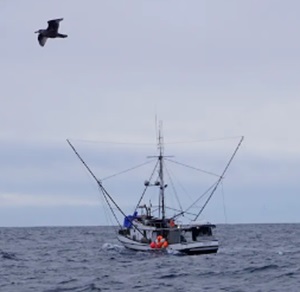 The Alaska Senate has proposed a new aid package for the state’s fish processing companies — some of which have been teetering among a crash in prices that’s caused an industry-wide crisis. The Senate, in its capital budget passed last week, included the $7.5 million grant to a nonprofit organization called SeaShare. Most of the cash would go toward buying out what SeaShare calls an “oversupply” of seafood from last year’s harvest, which it says is costing processing companies money to store in freezers. The program would add to more than $100 million in salmon and Alaska pollock purchases, more than 1,500 truck loads announced earlier this year by the U.S. Department of Agriculture. more, >>CLICK TO READ<< 14:46
The Alaska Senate has proposed a new aid package for the state’s fish processing companies — some of which have been teetering among a crash in prices that’s caused an industry-wide crisis. The Senate, in its capital budget passed last week, included the $7.5 million grant to a nonprofit organization called SeaShare. Most of the cash would go toward buying out what SeaShare calls an “oversupply” of seafood from last year’s harvest, which it says is costing processing companies money to store in freezers. The program would add to more than $100 million in salmon and Alaska pollock purchases, more than 1,500 truck loads announced earlier this year by the U.S. Department of Agriculture. more, >>CLICK TO READ<< 14:46
NOAA Fisheries Denies Request for Emergency Action on Bering Sea Chinook Salmon Bycatch
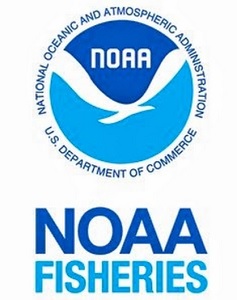 NOAA Fisheries denied a request for emergency action to institute a cap of zero on Chinook salmon bycatch in the Bering Sea pollock fishery. The request was submitted on January 17, 2024. It effectively asked Secretary of Commerce Gina Raimondo to close the Bering Sea pollock fishery, which opened on January 20, 2024. It was submitted by: Association of Village Council Presidents, Kuskokwim River Inter-Tribal Fish Commission, Tanana Chiefs Conference, Yukon River Drainage Fisheries Association, Yukon River Inter-Tribal Fish Commission. The petition also requested that the Department of Commerce urge the North Pacific Fishery Management Council to evaluate and update current Chinook salmon bycatch management. more, >>CLICK TO READ<< 13:08
NOAA Fisheries denied a request for emergency action to institute a cap of zero on Chinook salmon bycatch in the Bering Sea pollock fishery. The request was submitted on January 17, 2024. It effectively asked Secretary of Commerce Gina Raimondo to close the Bering Sea pollock fishery, which opened on January 20, 2024. It was submitted by: Association of Village Council Presidents, Kuskokwim River Inter-Tribal Fish Commission, Tanana Chiefs Conference, Yukon River Drainage Fisheries Association, Yukon River Inter-Tribal Fish Commission. The petition also requested that the Department of Commerce urge the North Pacific Fishery Management Council to evaluate and update current Chinook salmon bycatch management. more, >>CLICK TO READ<< 13:08
Alaska delusions – The great takeover of federal waters
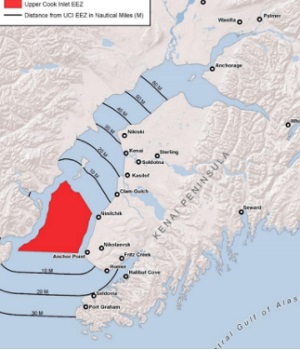 Oh if only the facts were as a trio of Alaska House legislators would like their colleagues to believe. They’ve drafted a resolution calling on Congress to extend state waters to 15 miles off the coast of Alaska because this would serve the state’s interest in supporting a “seafood industry generat(ing) over $163,000,000 in revenue for state and local governments.” All those zeros make that look like a great deal of money, but in terms of state revenue, $163 million is chicken feed. The state’s now fading oil industry is forecast to produce $3 billion in fiscal year 2024 or almost 20 times more, according to state projections. Worse though, the claim to $163 million in state revenue from the fishing industry comes from a report compiled for the Alaska Seafood Marketing Institute (ASMI) that is badly outdated, and the resolution now based on that report lacks the context which even the seafood sales promotion organization felt compelled to add. more, >>CLICK TO READ<< 08:56
Oh if only the facts were as a trio of Alaska House legislators would like their colleagues to believe. They’ve drafted a resolution calling on Congress to extend state waters to 15 miles off the coast of Alaska because this would serve the state’s interest in supporting a “seafood industry generat(ing) over $163,000,000 in revenue for state and local governments.” All those zeros make that look like a great deal of money, but in terms of state revenue, $163 million is chicken feed. The state’s now fading oil industry is forecast to produce $3 billion in fiscal year 2024 or almost 20 times more, according to state projections. Worse though, the claim to $163 million in state revenue from the fishing industry comes from a report compiled for the Alaska Seafood Marketing Institute (ASMI) that is badly outdated, and the resolution now based on that report lacks the context which even the seafood sales promotion organization felt compelled to add. more, >>CLICK TO READ<< 08:56
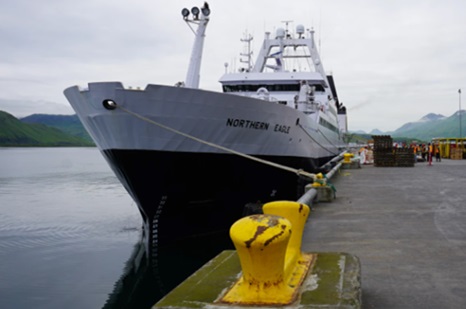
Fishery council seeks more information before deciding on chum bycatch in Bering Sea pollock fishery
The North Pacific Fishery Management Council, which manages federal fisheries in Alaska, will continue to explore options for how to manage chum salmon bycatch in the Bering Sea pollock fishery. The council, facing rising pressure from western Alaska communities who depend on chum as a cornerstone of subsistence, released a statement Wednesday summarizing their decision from their April meeting. Dismal western Alaska salmon returns have reached crisis levels. And while the council listened to scores of harrowing testimonies recalling empty rivers and vacant fish camps, the council was also presented with research that suggested bycatch limits wouldn’t do much to help the crisis. “Available science indicates recent declines in chum salmon populations across many regions of the North Pacific, including Canada, Japan, Russia, Korea, and the U.S., appear to be driven by warmer water temperatures in both the marine and freshwater environments,” the council said in the statement. more, >>click to read<< 12:38






